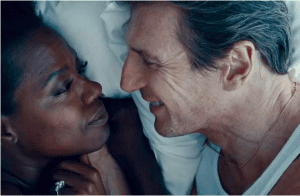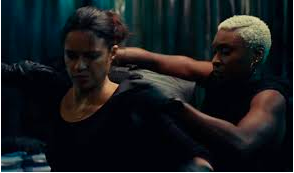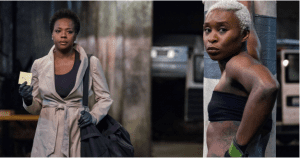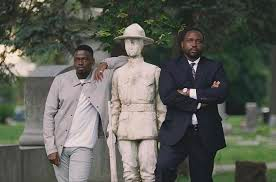When They Go Low, We Go High*
Movies are a drug for me, and there’s a certain type of movie that delivers a high that simply can’t be beaten. They don’t come around too often, but when they do, it’s like a blast of pleasure to the left and right hemispheres of my brain simultaneously.
Take a moment and imagine there are really two kinds of movies. Low film and high film. Low films are, first and foremost, designed to entertain. That doesn’t mean they’re disreputable or of poor quality, though they can be. Transformers and Suicide Squad are low films that are also eau de garbage. Raiders of the Lost Ark and The Avengers are low films that do what they do with skill and intelligence. These movies give you an endorphin rush, and when they’re done right, they don’t just send you out of the theater with a bounce in your step. Years later, you continue to cherish them.
High films, on the other hand, are designed to make a statement. Artistically, politically, morally, they have something to say. Keep in mind that just because it’s a high film, it’s not necessarily a good film. Schindler’s List and United 93 are masterpieces. Crash is terrible and Driving Miss Daisy is fluffy nonsense.
When you get that perfect merger of high and low film? It’s magic. Black Panther is about the responsibility of power, and about a guy in a cat suit whipping 18 kinds of ass. Goodfellas is about how the lack of honor among thieves trumps the honor of the family, and about Joe Pesci behaving like an entertaining psychopath. Widows is one of those movies, and in this Thanksgiving season, I feel thankful to have it.
 Veronica (Viola Davis) lives in a sleek apartment in Chicago’s Gold Coast. Her life is comfortable, and that’s because her husband Harry (Liam Neeson) is a talented thief. Talent, like luck, eventually runs out, and that’s also true for Harry. Along with his crew comprised of Carlos (Manuel Garcia-Rulfo), Florek (Jon Bernthal), and Jimmy (Coburn Goss), he’s killed in a hail of police bullets when a heist turns disastrously wrong.
Veronica (Viola Davis) lives in a sleek apartment in Chicago’s Gold Coast. Her life is comfortable, and that’s because her husband Harry (Liam Neeson) is a talented thief. Talent, like luck, eventually runs out, and that’s also true for Harry. Along with his crew comprised of Carlos (Manuel Garcia-Rulfo), Florek (Jon Bernthal), and Jimmy (Coburn Goss), he’s killed in a hail of police bullets when a heist turns disastrously wrong.
Disaster has a way of coming back around, and Veronica finds that out the hard way. You see, Harry stole $2 million from crime lord Jamal Manning (Brian Tyree Henry). Jamal needs that money to go semi-legit and finance a campaign to be the alderman of Chicago’s 18th ward. It’s a tight race, considering Tom Mulligan (Robert Duvall) has been holding the seat forever, and his Kennedyesque son Jack (Colin Farrell) is viewed as next in line.
So what’s Jamal’s plan? Simple, he threatens Veronica and her adorable Westie,** and tells her she has one month to  pay back her departed husband’s $2 million debt. I know, it’s a dumb plan, but you try telling a violent gangster he has a stupid plan and see how far you get. At this point, Veronica needs help. She’s not the only one in a bind.
pay back her departed husband’s $2 million debt. I know, it’s a dumb plan, but you try telling a violent gangster he has a stupid plan and see how far you get. At this point, Veronica needs help. She’s not the only one in a bind.
Carlos’ widow Linda (Michelle Rodriguez) put her heart into a shop and lost it due to Carlos’ gambling debts. Jimmy’s widow Amanda (Carrie Coon) has a four-month-old baby to look after. Flore’s widow Alice (Elizabeth Debicki) has nothing except for a mother (Jacki Weaver) nudging her into a career in high-class prostitution. When Veronica finds her dead husband’s notebook, she finds detailed plans for his next job and a $5 million payday. Each of these women now has a choice to make.
I feel so lucky that this movie exists in this particular incarnation. We’re lucky because Steve McQueen, the Academy Award-winning filmmaker of 12 Years a Slave is directing. In previous films, McQueen has examined the resiliency of  people and how they deal with body horror caused by slavery, sex addiction, or gnawing hunger. He’s still examining resiliency, but this time it’s about how women survive the endless abuses caused by men. Alice goes from nursing a black eye given to her by Florek to enduring passive-aggressive comments from a wealthy developer (Lukas Haas). McQueen tells us the abuses of sexism never stop. They ebb and flow, and while the severity changes, the existence of the abuse never does.
people and how they deal with body horror caused by slavery, sex addiction, or gnawing hunger. He’s still examining resiliency, but this time it’s about how women survive the endless abuses caused by men. Alice goes from nursing a black eye given to her by Florek to enduring passive-aggressive comments from a wealthy developer (Lukas Haas). McQueen tells us the abuses of sexism never stop. They ebb and flow, and while the severity changes, the existence of the abuse never does.
McQueen also has a wonderful gift of calling attention to a point without bringing the entire film to a screeching halt. There’s a scene where Jack Mulligan leaves a campaign event. It’s located at a deserted lot in a run-down part of town. In a subtle and breathtaking single shot, we see Jack’s limousine pull away. As it drives, the neighborhood gradually changes, gradually improves. Finally, the limo stops at Jack’s opulent home. In a shot lasting less than a minute that includes dialogue, McQueen makes a devastating point about the effects of gentrification, racism, and power. Oliver Stone only dreams of that kind of subtlety.
Along with McQueen, the screenplay is written by the fiendishly clever Gillian Flynn. You’ve seen her pitch-black sensibilities before in Gone Girl and Sharp Objects, and she excels at twisty-turny, “one damn thing after another” tales. Flynn and McQueen’s script never veers toward being too preachy, and the dialogue hums with energy without overtly calling attention to itself.
 The cast is hugely talented, perhaps the best of the year. We have an old pro like Robert Duvall who can take a character that’s a one-note racist and make him compelling. We have Michelle Rodriguez, stuck for years*** playing a tough chick, finally given the chance to flex her dramatic muscles. As Alice, she’s not playing a character type. She’s playing a distinctive person, and doing it very well. We have Elizabeth Debicki as Alice, and watching her gradual shift from victimhood to survivor is thrilling. We have Cynthia Erivo, who stole Bad Times at the El Royale, as a quick-thinking babysitter. I’ll say it again — Erivo needs to be a major star. We have Daniel Kaluuya as Jatemme, Jamal’s brother and chief enforcer. He’s basically playing The Terminator, and nearly every time he’s in a scene with another human being, something terrible is going to happen.
The cast is hugely talented, perhaps the best of the year. We have an old pro like Robert Duvall who can take a character that’s a one-note racist and make him compelling. We have Michelle Rodriguez, stuck for years*** playing a tough chick, finally given the chance to flex her dramatic muscles. As Alice, she’s not playing a character type. She’s playing a distinctive person, and doing it very well. We have Elizabeth Debicki as Alice, and watching her gradual shift from victimhood to survivor is thrilling. We have Cynthia Erivo, who stole Bad Times at the El Royale, as a quick-thinking babysitter. I’ll say it again — Erivo needs to be a major star. We have Daniel Kaluuya as Jatemme, Jamal’s brother and chief enforcer. He’s basically playing The Terminator, and nearly every time he’s in a scene with another human being, something terrible is going to happen.
We’re lucky because we have a lead performance from Viola Davis that’s controlled, disciplined, and powerful. She’s got the ability to impart more meaning in a look than many actors can in an entire monologue. I love when actors let us see their characters thinking and making decisions, and we see Victoria emerging from her grief and making choices. I thought that Toni Collette’s operatic performance in Hereditary was Oscar-worthy, as it was a primal howl of pain. Davis’ performance is the polar opposite. Locked-down, subtle, but no less impressive.
Widows is very much a genre crime movie with shifting loyalties and a couple of muscular action sequences. However, it’s not a rah-rah celebration of girl power, a meatheaded action movie, or a dusty ripoff of Quentin Tarantino’s work. It’s a fusion of low and high film that operates with assured craftsmanship and is very much itself. This is one of the best films of the year.
*Michelle Obama might not appreciate this, but at least I’m giving her credit.
**Fun and totally irrelevant factoid — this is the same Westie that was in the outstanding Game Night. Maybe this is the beginning of a new cinematic universe?
***Rodriguez is so much better than The Fast and the Furious films.








